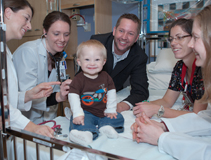
Assistant Professor Elizabeth Cox, MD, PhD, is helping families participate more fully in the care of their children while hospitalized at American Family Children’s Hospital (AFCH).
Through recent grants from the Arthur Vining Davis Foundation, the Agency for Healthcare Research and Quality, and the National Patient Safety Foundation, Dr. Cox is working with colleagues from several inpatient services to develop, implement, and evaluate ways to enhance family-centered rounds (FCRs) for hospitalized children.
In FCRs, physicians, nurses, residents, other healthcare team members, and students round as a team, actively engaging the child and family in each encounter.
One of Dr. Cox’s partners is Assistant Professor Michelle Kelly, MD, a pediatric hospitalist who has championed FCR at AFCH. Their TEAM Kids (Teaching, Engaging, and Managing on Rounds with Kids) initiative has garnered strong institutional support and cooperation from AFCH staff and families.
Dr. Cox’s research team also collaborates with experts in psychology and human factors engineering to study FCRs from multiple angles. In one project, her team is investigating how FCRs specifically promote patient safety. In another, researchers are identifying factors that hinder and support FCRs, and strategies to address those factors. In a third, her team is implementing FCR best practices and measuring the impact of these interventions on aspects of patient care and on medical student education.
Not only will these initiatives improve the care of children at AFCH, they will also serves as a model for other institutions, and may influence policies on pediatric inpatient care.